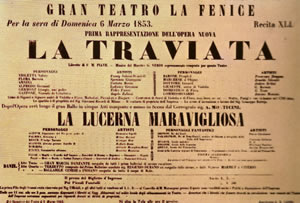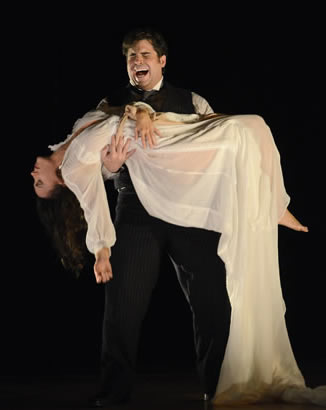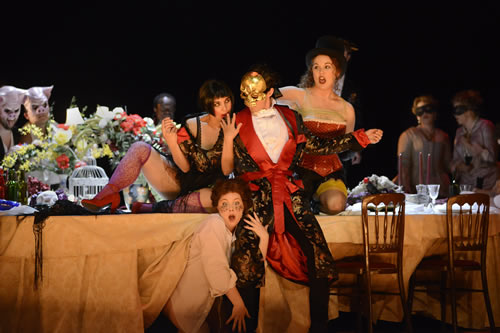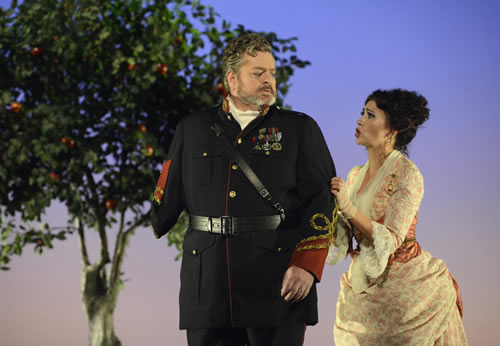Boston Lyric Opera Does Honor
to Verdi's La Traviata
by Jennifer Kreingold
October, 2014
 |
Giuseppe Verdi’s La Traviata
Librettist: Francesco Maria Piave
First performance: March 1853
Violetta: Anya Matanovic, soprano
Alfredo Germont: Michael Wade Lee, tenor
Giorgio Germont: Weston Hurt, baritone
With Jon Jurgens, Chelsea Basler, David Kravitz,
David Cushing, David Wadden, Rachel Hauge and Omar Najmi
Boston Lyric Opera Orchestra and Chorus
Conductor: Arthur Fagen
Director: Chas Rader-Shieber
Artistic Director: John Conklin
October 10-19, 2014
The Boston Lyric Opera’s opening night performance of Giuseppe Verdi’s opera, La Traviata, directed by Chas Rader-Schieber, delivered Giuseppe Verdi’s powerful message with sonorous belcanto and effective staging. The composer's direct assault on hypocrisy,status and the prevailing culture of his Europe, counterposed to a higher reality of true honor, love and self sacrifice, was transparent in this production.
 Photo credit: Eric Antoniou for Boston Lyric Opera © 2014 |
What unfolds before the audience’s eyes is a tragic story which seems all too familiar to society today. A young courtesan, Violetta, (played elegantly by Anya Matanovic) dying of tuberculosis, changes her life for the better, after falling in love with Alfredo (tenor, Michael Wade Lee), only then to be asked by Alfredo’s father, Giorgio Germont (baritone, Weston Hurt), to “honor” his family by leaving Alfredo forever. Later, Violetta even tries to warn Alfredo that his life is in danger, after he wins a gambling match against the Baron (David Kravitz). But, Alfredo, unable to see through his jealous rage, reprimands and insults her in front of an entire group of revelers. Some time later, after having a change of heart, Germont and Alfredo rush back to Violetta, only to find her in her final dying hours. Violetta, resigned, accepts that she is going to die, and that even the love of Alfredo will not save her. Barely able to hold herself up, in a flowing white nightgown with a long train and with her hair loosely hanging down her back, she sings the heart-wrenching aria, Addio al passato, which was tenderly and expertly sung by Ms. Matanovic. Germont laments his mistake, and Alfredo begs for her forgiveness. Soon after, Violetta dies in the arms of Alfredo.
As the curtain falls, the honest audience member has a lump in his or her throat and some tears in the eyes, not only from the sheer sadness of the story-line and the deep beauty of Verdi’s music, but from observing from their seat, for two-and-half hours, the eerie sense of darkness pervading the society of the mid-19th century Europe into which Verdi was intervening. The audience member, in a sense, feels helpless, watching each character make one mistake after another: failing to break out of the surrounding cultural environment, and then each one eventually succumbing to their inevitable doom.

Photo credit: Eric Antoniou for Boston Lyric Opera © 2014 |
The brilliance of Verdi’s “musical dramas” is that they “push something which otherwise cannot be touched.”[1] After all, Italy was still not a unified nation at this time in the 1850s, and was still occupied by foreign powers; and although by 1860, Italy became a nation, the population was still uneducated and illiterate. Even if you make profound political changes in a nation, if the population is not developing and becoming more educated, then there is the danger that a nation can fall back and disintegrate very quickly. So, the subject of La Traviata (the Fallen Woman), addresses something which otherwise would be completely taboo; a courtesan who breaks out of a life of pleasure and actually experiences real human emotion such as love, selflessness and compassion. This implicitly tells everyone in the audience that they too, can become better, just as Violetta does. This was well executed by the BLO performance, specifically in Act II, scene 2, during Flora’s party, which John Conklin, BLO’s artistic director, made purposefully much more degenerate and bawdy than the opening party scene, with women being raped by scantily-clothed men among the revelry, as they sing: “Noi siamo zingarelle venue da lontano” (We are gypsy girls that come from afar). Violetta is half-heartedly sitting and observing the corrupt goings-on at this party. As Conklin puts it: “the surface has been brutally stripped off, and the decadent underbelly revealed.”[2] Suddenly the audience member comes to the realization that they are seeing the party through Violetta’s eyes; the eyes of a woman who has changed, who has come to reject the degeneracy and therefore sees underneath the seeming harmless pleasure.

Photo credit: Eric Antoniou for Boston Lyric Opera © 2014 |
So, to whom can the audience member relate? Is Germont just being a ‘fatherly” figure, protecting his son and his family? Is Alfredo just helplessly in love, and blinded by that? Is Violetta the heroine or the victim? Who is the honorable one; the noble one? Is it “honorable” to ask Violetta to leave Alfredo? She selflessly agrees to do it, out of her love for Alfredo, but on the other hand, she is unable to resist the pressure that Alfredo’s father puts on her. Germont says to Violetta: “those tears announce the happy day that Heaven will send to bless thee. This unbounded sacrifice you make of love for duty, is so noble, it will soon impart a glow of pride to you.”
Weston Hurt really captivated the audience when he beautifully and warmly sang Di Provenza. In this aria, Germont expresses his love to his son, but he says “It was God who brought me here! You do not know what pain your old father has suffered. . .” In both cases, he is saying that God and Heaven are the reason for his actions. What kind of God would drive a man to ask a dying woman to go back to a meaningless life for the sake of saving face? So, again the audience must ask, what is really driving the actions of these characters?
This leads us again to the question of classical tragedy, and that ultimately, the purpose of the drama is to move to the audience. American audiences may find themselves very soon to be in a fundamentally changed situation, given the cultural and socio-economic crises mankind is facing today. Certainly this particular audience at Opening Night at the Boston Lyric, in their formal gowns and tuxes, expressed great gratitude to the soloists, and clearly enjoyed the opera, but displayed many of the same behaviors that Verdi so poignantly polemicizes against in the opera. It was almost as if at any moment, the audience could have broken into singing Libiamo: “everything is crazy in the world which is not pleasure. . .let’s enjoy the pleasures fleeting and fast. . “ Yet, if one listens carefully, one can hear the very ominous drumbeat underneath Libiamo, coloring the carefree nature with a sense of dread, as the manic mob demands more and more pleasure, to numb away the realities of the “crazy” world outside. Thus, we must learn from the poets: “Only the stage is permitted to ridicule our weaknesses, since it spares our sensibilities, and knows no such thing as a guilty fool. Without reddening with embarrassment, in its mirror we can see our own mask fall away, and thank it secretly for this gentle reproach.” (from Friedrich Schiller from “The Theater as a Moral Institution”)
[1] Lyndon LaRouche in informal discussion with LPAC scientific research team, October 2014.
[2] Notes on La Traviata by John Conklin, page 7.
